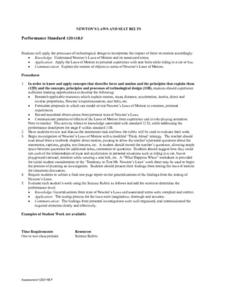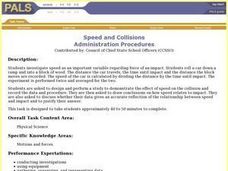Curated OER
Newton's Laws and Seat Belts
Students study Newton's Laws of Motion. They review an assessment task and rubric and discuss Newton's Laws of Motion. They discuss how to test the relationships of mass and acceleration in personal situations. They write a one-page...
Curated OER
Work and Energy
Students show that energy is conserved in the laboratory. They calculate the work done by a force on an object as the product of the force and a displacement of the object from a reference point.
Curated OER
MagLev Train System Activity
Students are able to analyze practices that affect the use, availabiltiy, and management of natural resources. They are able to show that the forces of friction retards motion. Students investigate electricity and magnetism as...
Curated OER
Mechanical Advantage and Simple Machines
Students investigate simple machines. They calculate the work done by simple machines and compare the force or direction of force applied. They calculate mechanical advantage and efficiency of simple machines and identify compound...
Curated OER
Work in Linear Mechanical Systems
Learners are able to identify the units associated with linear work. They are able to calculate the work done on an object. Students discover how the force exerted on an object and the distance the object moves determines the work done...
Curated OER
Simple Machines
First graders discuss work, force, and energy. They study how work is done. Students discuss various types of work that are done. They act out how work is done. Student draw pictures of types of work they have done.
Curated OER
Lesson 5: Boyle's Law
Students participate in a lab to verify Boyle's Law using applied force (weight) to do work on a closed isolated system of air. "Elasticity of Gases Apparatus, BASIX" from Sargent-Welch is the syringe apparatus used to measure volume...
Curated OER
Motions and Forces
Students explore motions, forces and magnetism. They investigate magnetism as a force and examine the construction of a magnet. Students examine the force that magnetism produces.
Curated OER
Laws of Motions
Seventh graders explore the Laws of Motion. They define friction and explain the concept of inertia. Students explain what happens when a force is exerted on an object that is in equilibrium. They state the second and third laws of motion.
Curated OER
Newton's Laws with Kick Balls
Eighth graders participate in different activities that reinforce Newton's Laws. Activity begins with question/answer session about Newton's first and second laws. Students then try to bounce kick ball off of a wall to get it to given...
Curated OER
Simple Machines/Technology/ Force
Third graders study and define force. They determine that the cause of movement is pushing or pulling which are the types of force used when operating simple machines. They experiment to determine which object requires the most amount of...
Curated OER
Hooke's Law
Students explore the relationship between the force applied to a spring and its stretch. They design and conduct an experiment to determine the stretch of spring with 15N of force without having an actual 15N mass.
Curated OER
Speed and Collisions Administration Procedures
High schoolers investigate speed as an important variable regarding force of an impact. Students roll a car down a ramp and into a block of wood. The distance the car travels, the time until impact and the distance the block moves are...
Curated OER
Exploring the MapleCopter
Study explore the motion of maple seeds and design experiments to explain their spinning flight patterns. They make observations, explain ideas of motion, use models, analyze previous reports and experiments, identify relevant factors...
Curated OER
Force & Motion
Third graders are introduced to the concepts of force and motion. In groups, they travel between stations to analyze the effect of force and motion on various objects. They research how various careers use these concepts as well.
Curated OER
Using Video to Quantify a Reflex Response to a Stimulus
Students examine the effects of a stimulus on a reflex by changing the strength or force at which the stimulus is applied. Students chart and record data of the lab using video tape.
Curated OER
Multimedia to Learn Textbook Science
Young scholars work in cooperative groups to produce multimedia presentations to explain how the movement of a yo-yo. Students research information about force and motion and relate it to the movement of the yo-yo.
Curated OER
If You're Under Pressure, Blame It On The Air Force
Students complete an experiment in which they demonstrate that air exerts a force. In groups, they create their own siphon and define air pressure. They estimate the time it might take to siphon various amounts of water. They collect,...
Curated OER
Steep, Steeper, and Steepest
Fifth graders discuss ways to move large rocks. They relate this to building a rock garden, and the ways people might load boulders into a truck. Students discuss the use of a ramp vs. lifting the boulder straight up onto the bed of the...
Curated OER
Forces and Movement
Students investigate the forces of pushing and pulling by participating in a whole group activity involving a toy car. Students then participate in a small group experiment involving a toy car, small weights and various materials....
Curated OER
Tower Investigation and the Egg
Students build three types of towers, engineering them to hold an egg one foot high for 15 seconds. They discover that engineering designs are subject to constraints such as time, money and size specifications. In this activity students...
Curated OER
Hanging Around
Students explore weight by building a spring scale and observing how it responds to objects with different masses. Each team of students can make their own spring scale by following steps which are specifically outlined in the plan. As...
Curated OER
How Far?
Students explore how different textures provide varying amounts of friction to objects moving across them. They build a tool to measure the amount of friction between a note card and various surfaces by measuring the distance that a...
Curated OER
Causal Patterns in Air Pressure Phenomena Section 2
Young scholars compare models depicting air pressure, They determine which model best conveys the omnidirectional and passive nature of air pressure

























